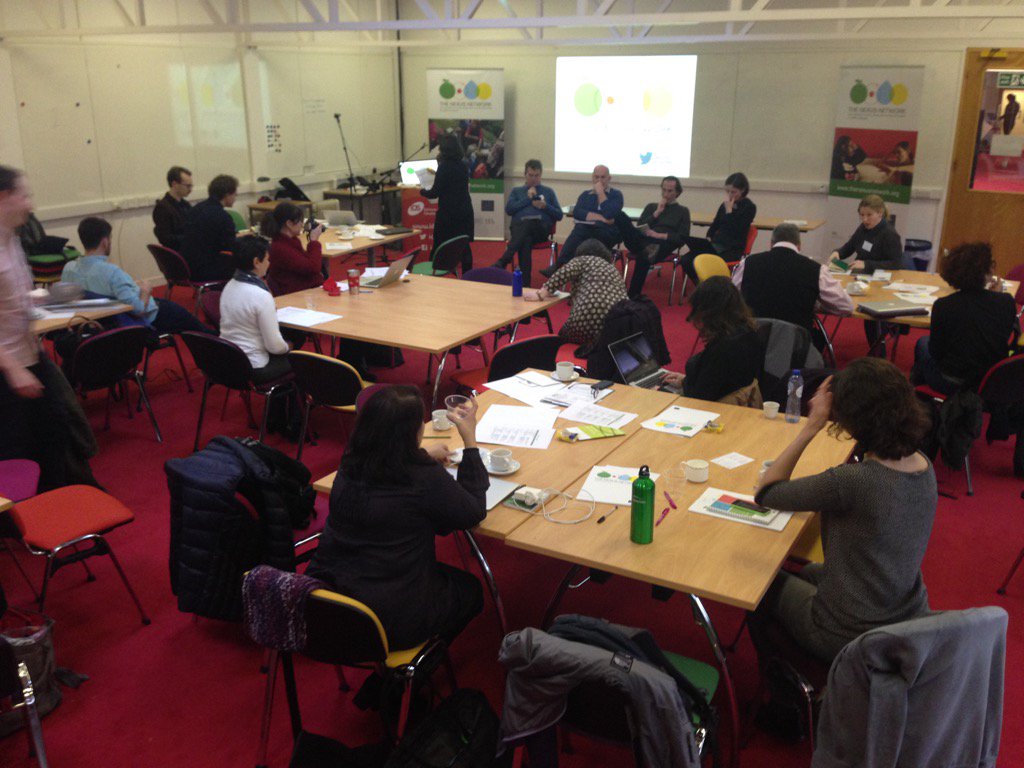Nexus network meetings are a bit like a bar scene in Star Wars, joked Professor Mike Bradshaw, from the University of Warwick: “What we need is a universal translator to make sense of the different languages and topics covered.”

The nexus which, to a newcomer at least, might sound like a potent
ial name for a galactic empire ship, is actually the term used for an approach that aims to understand the inter-linkages between the fields of land, water, food and climate. Since the 2008 World Economic Forum pushed players to think about water, food, and energy security and their inter-linkages, the nexus has been a policy metaphor to address the ‘world in crises’. The Nexus Network workshop aimed to create debate and develop research agendas around the themes of the nexus, resource conflicts and social justice.
The “crisis” of capitalism and neo-liberalism was a key theme to come out of the conference. Steffen Boehm, from the Essex Sustainability Institute (ESI) at the University of Essex, Colchester, said we need to adopt a wide historical perspective to understand the nexus. Conflicts in the water or the energy sector, he said, all tend to be centred around similar processes of expropriation, commodification and commercialisation that in turn give rise to social movements that are resisting these processes. Wherever you have a riots going on, if you “follow the crises”, Boehm said, that’s where the capitalist system is “bursting at the seams.” It is at those crises that we can begin to analyse the unequal distribution of resources.
Professor Rosaleen Duffy, from the School of Oriental and African Studies, described the increasing neo-liberalisation of wildlife in her presentation by charting the rise of a new narrative that is describing poachers as terrorists, while states and non-governmental organisations use increasingly militarised approaches in the ‘war by conservation’. She referred to a 2012 Elephant League report that said that poaching and illegal wildlife trafficking of illegal ivory was a major source of funding for al-Shabaab. This report became cited extensively, despite UNEP and Interpol and other organisations questioning the veracity of the report. Hilary Clinton and Barack Obama have also drawn links between the relationship between wildlife trafficking, poaching and global security.
Duffy argues that this is not just a matter of semantics. The narrative has directly spurred on calls for more forceful approaches to protecting wildlife. Organisations responsible for protecting wildlife are now turning to private companies, says Duffy, to train poaching units and use surveillance to protect wild animals in parks, which have become financial assets or the “cash cows” of tourism. Communities now live on a “frontline on terror”.

More broadly, these narratives of scarcity and uncertainty are also leading to the nexus being framed in the language of security, and many presenters flagged this as an area of concern that needed monitoring.
Farmers and fisherfolk are already part of the nexus
A number of participants pointed out that the silos that the nexus network may aim to break down exist in bureaucracies and academia and not at the “grassroots”. Farmers and those people who are living off the land or water, are already part of the nexus. “The nexus is implicit in their livelihoods,” said Alma Lopez-Aviles when describing the lives of rural people living near the Blue Nile in Ethiopia, who generally have no running water in their houses and cook with charcoal. Lopez-Aviles provided an overview of the Grand Ethiopian Renaissance dam, which is currently under construction, in order to provide energy to meet the country’s growing energy needs. The question, says Lopez-Aviles, is whether the dams can improve the livelihoods of people in the country.
Making corporates accountable to smallholders
Alex Bolding, from Wageningen University, shared his research on irrigated sugar farming in Mozambique and Malawi and the asymmetrical power relationships between smallholder sugar cane outgrowers and two sugar companies (Tongaat Hullett, the largest sugar producer in South Africa, and Illovo Sugar, the biggest producer in Africa), which have been expanding sugar cane production in southern Africa. The research, he said, needs to be understood within the context of rising food and oil prices in 2008, which led to a number companies making land applications to commercially farm 12 million ha of arable land in Mozambique, with either food or biofuel crops (sugar is both).
In both locations Bolding looked at, existing smallholder producers are often displaced from their land (and water). Smallholder farmers are organised into outgrower farming associations to produce sugar cane for the companies and sugar production capacity has increased. The companies provide the farming associations with access to development funds but, crucially, they outsource the financial and production risks back onto those associations. If the crops fail, that’s the smallholder farmer’s problem.
This was one of many examples that led participants to question how to make companies accountable to the smallholders, and not only to their shareholders. When asked for solutions, Bolding suggested that the answers lay with the farmers themselves, but tentatively suggested that answers might lie in horizontal social movements or structures, such as cooperatives or farmer unions that are capable of eliciting a more equitable deal. He also felt it was important to have more transparency and communication on the issue to make consumers aware of where their sugar was coming from.
Is integration the goal of nexus?
Lucy Baker, a research fellow in the Centre for Innovation and Energy Demand in the Science Policy Research Unit at the University of Sussex, challenged the idea that integration was the goal of the nexus approach by asking: “How do we get beyond the idea that everything is connected?” Baker warned that the nexus could be raising the same old questions of development: trade, finance, and conventional development models. “Is the nexus becoming another form of development discourse?” she wondered. In relation to questions of political economy she asked: “Where does labour and land fit into all this?”
Baker suggested that when discussing alternatives, the solutions can’t always be small-scale, pointing out that electricity grids are by their very nature, large-scale. We need to think at different scales for alternatives, she suggested.
What is the nexus? Where’s Wally?
Nick Hildyard, from Cornerhouse, said that finding out where the nexus was a bit like finding Wally in a Where’s Wally book. He suggested that by unquestioningly using terms such as “food” or “energy”, participants were taking for granted concepts that have deep historical roots that are linked to capitalism. But he felt that activists needed to monitor nexus discourse on limits and boundaries, and how this is linked to the commodification of resources.
Continuing on from this reference, Ian Scoones, Director of the ESRC STEPS Centre at Sussex, suggested that “where we locate Wally matters”. Wally is hidden in two different narratives or “story books” and the standard Wally narrative, he said, is the dominant, mainstream approach that starts with a crisis (often modelled around the notion of scarcity or planetary boundaries) and ends with a managerial solution: “This could be called, ‘Wally goes to the World Economic Forum and the sub-title is that Wally learns managerial integration’,” he said.
But, what happens if we reverse the analysis and ask the questions in a different order, asked Scoones? He suggested instead starting with how the resources are used as part of people’s day-to-day livelihoods to understand the crisis of capitalism and how it’s having an impact on livelihoods. Then Wally’s story becomes about how Wally meets political ecology: how people’s livelihoods interact with capitalism, “practice, power and politics”. The story, said Scoones, is then about the crisis of capitalism and where and why resource conflicts emerge, and how politics and power emerge from that crisis. This Scoones argued, moved the debate on from aiming to integrate across sectors to creating spaces for democratic debate.
This provides only a brief snapshot of some of the presentations and comments made at the conference. To return to the Star Wars analogy: everyone talked and debated, and mostly spoke the same language. Happily, where differences emerged, no one ended up having their arm removed with a light sabre.